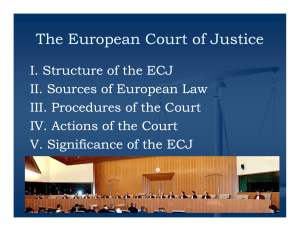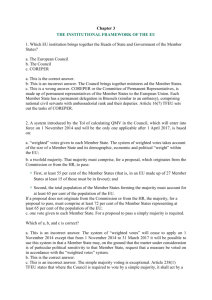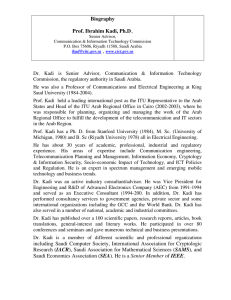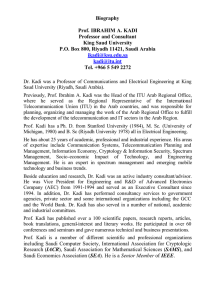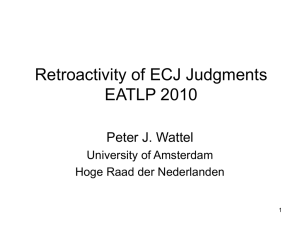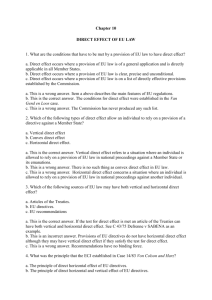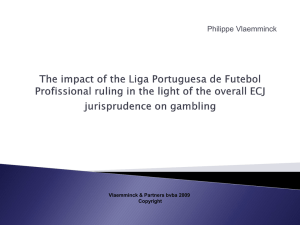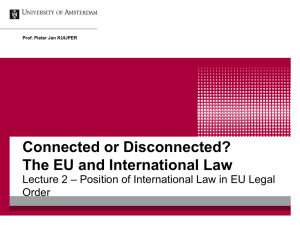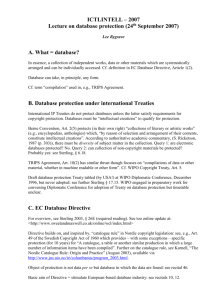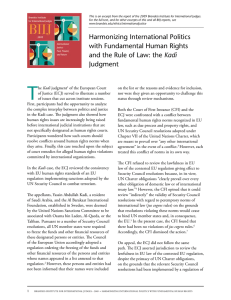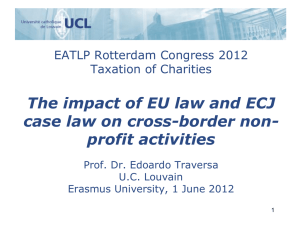group presentation
advertisement
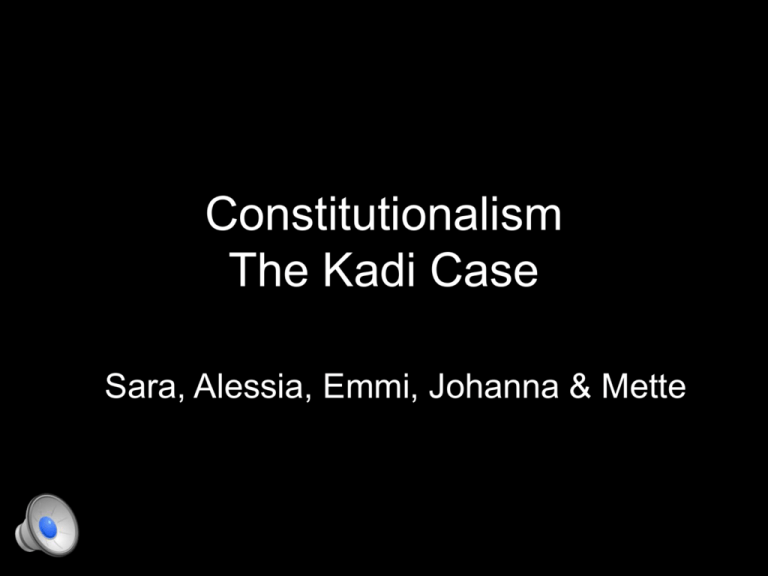
Constitutionalism The Kadi Case Sara, Alessia, Emmi, Johanna & Mette 28TH September 2001 The world is in panic after the 9/11 attacks. The UNSC imposes a new regulation as a counter terrorism act, binding for all member states. The resolution includes smart sanctions as a measure of impeding the work of potential terrorists, meaning that whoever is suspect of terrorism will be blacklisted without any notice and have his/her financial assets frozen….. Did they really agree to this?!! Meanwhile, on Twitter…. Actual George Bush quote The European Council adopted the regulation EC 881/2002 in order to implement the resolution into EU law. A regulation has direct effect on all EU membership countries. Soon, some people feel the immediate consequences… Back to twitter… Youssef Kadi is accused of having provided funds for terrorists. Kadi, feeling that his fundamental rights have been violated, takes his case to the European Court of Justice after having first tried at the Court of First Instance. Long story made short: Advocate General Miguel Maduro argues: This guy The EU should rule according to the UN charter. Fundamental human rights have to be protected. Following Maduro’s opinion, The ECJ rules in favor of Kadi and annuls against the initial judgements of the CFI and against the council regulation 881/2002. This ruling caused quite a debacle. Grainne de Burca (picture) argued that this ruling questions UN authority and disrupts the development of international law NOT Happy with this ruling. This pessimism is not shared by everyone Turkuler Isiksel is content with the outcome of the ECJ’s ruling, expecting to see a shift in the priorities of the EU towards human rights. SO happy! The debate around the Kadi Case captures the academic community investigating constitutionalism. No hacking of twitter accounts was committed during the making of this slide show. All tweets are purely fictional. Presentation Outline 1. 2. 3. 4. 5. 6. Main research Question Method Clarifying questions and comments Summary of main arguing points Conclusion/Criticism Looking ahead - Discussion Research question What happens when UN legislation interferes with fundamental human rights? Method • • • • Initial RQ PBL & Funnel-Method Comparative analysis: Artificial debate Wish to make the debate accessible What are the Consequences of the ECJ making efforts to promote Human Rights? • Kadi as occasion for ECJ to send a Message about… • “the autonomy of the European legal order” (5) “ • a prioritisation of the status of fundamental rights norms within the supranational constitutional architectonic” (552) • Normative Power EU?! NORMS • Deviation from EU’s former role as “a ‘normative power’ committed to effective multilateralism under international law” (3) • Intensification of normative power possibility of “a new constitutional primacy for fundamental rights” (556) What are the Consequences of the ECJ making efforts to promote Human Rights? • ECJ’s motives for pluralist approach: Authority Consolidation Civil Disobedience • Effects on domestic law – “ […] local constitutional norms as a barrier to the enforcement of international law” (de Burca: 49) – “national courts to engage in similar acts against the ECJ´s authority.” (Isiksel: 569) What are the Consequences of the ECJ making efforts to promote Human Rights? • “accountability dilemmas of international governance” (de Búrca 7) Confused accountability Clarified accountability Is promotion of cosmopolitanism in terms of protecting the individual disturbing fruitful collaboration of international institutions? • Cohen: – Security matters have grown most important – bad development – Only illegitimate orders are disturbed - the individual needs a court where he or her rights can be defended – The cooperation becomes a goal in itself, disturbing the proper focus --> global law and community values rather international peace per se. Is promotion of cosmopolitanism in terms of protecting the individual disturbing fruitful collaboration of international institutions? • Isiksel: – No - and the promotion of Human Rights is superior to successful cooperation – The ruling of the ECJ should not be interpreted as hostile as De Burca argues, but it is an act of civil disobedience. Is promotion of cosmopolitanism in terms of protecting the individual disturbing fruitful collaboration of international institutions? • De Burca: YES Has big faith in international cooperation – Protection of Human Rights does not depend on cosmopolitanism. The necessary institutions exist – they only need reforms. – “There is no reason why a carefully tailored set of accountability principles should not be capable of navigating successfully between the risk of defensive practices arising from too high a standard of responsibility and the risk of abuse arising from impunity” (10)" Summary Getting de Burca involved • A need for strong international cooperation • Positive outcome of Kadi; triggering reform in the UNSC process • Critique ECJ; not grounded in international law • UNSC: – needs to respect procedural fairness – flawed institution – still performs an important role Criticism • Stepping back: The perception of constitutionalism will shape the entire debate • Monist vs. Pluralist • Different definitions – same debate? Our journey from the funnel- to the hour-glass method Looking ahead • Would you prefer the development of the UN to head towards further constitutionalism or would your prefer it to scale back its powers? – No wrong answers Thank you for your attention Special thanks to @GlobalGirl a.k.a Grainne de Burca @IR-Queen a.k.a Antje Wiener For inputs and assistance © Constitutional Turn – Group 3 2012
